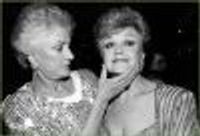Arena Stage "Music Man"-set in the 1930's...
#75Arena Stage
Posted: 5/24/12 at 4:24pm
Ooooh...interesting. I like that idea. I would also be interested in perhaps something of the orchestrations for other numbers getting a little 'dustbowly'.
I will say that I'm someone who can have purist tendencies...but I've fought my whole creative life against them. So this argument is interesting to me because it's the argument I've been having with myself since I started doing theatre.
#76Arena Stage
Posted: 5/24/12 at 4:25pm
i guess i just don't agree that the value of the music man comes first and foremost from its usefulness as a history lesson. the original incarnation will obviously always be the definitive one; this is just an experimental variation on an already well-established theme.
Updated On: 5/24/12 at 04:25 PM
Gaveston2
Broadway Legend Joined: 6/28/11
#77Arena Stage
Posted: 5/24/12 at 4:33pm
lida, I didn't mean to say the show's PRIMARY purpose is a history lesson. Obviously not. I just think it's a shame to lose the historical color by negating it with a change of setting.
But I agree with your second point: THE MUSIC MAN will continue to exist (on stage and on film) as Willson intended. This production isn't a calamity.
#78Arena Stage
Posted: 5/24/12 at 4:44pm
I just think it's a shame to lose the historical color by negating it with a change of setting.
i agree. i definitely have my reservations about this production, and i think the strongest interpretations will always be the ones that set it squarely in 1912. but i don't think it's ruined beyond recognition by having the references no longer be accurate or make perfect historical sense, whether the audience recognizes them or not. those references are just that, color-- but i know many people disagree with me about how integral they are to the show's success.
Updated On: 5/24/12 at 04:44 PM
Gaveston2
Broadway Legend Joined: 6/28/11
#79Arena Stage
Posted: 5/24/12 at 4:51pm
I'm not sure the same sort of innocence existed in the 1930s. People had radios by then and listened to the President live every week. They went to the movies regularly and saw people playing pool on screen. They had lived through Prohibition and the rampant criminality associated with it.
Of course, there were all sorts of religious hucksters in revival tents and maybe that's what this director is going for.
But Harold Hill isn't a preacher and the list of reasons why the show does NOT belong in the 30s is a lot longer than the list of reasons why it does.
#80Arena Stage
Posted: 5/24/12 at 4:54pm
How would you all feel about a production of "Grease" set in the late 1980s?
That's a serious question, not a joke.
blocked: logan2, Diamonds3, Hamilton22
#81Arena Stage
Posted: 5/24/12 at 4:56pmIs it just me, or does the ensemble look really sloppy in those clips (specifically in "Shipoopi" and "Trouble")?
#82Arena Stage
Posted: 5/24/12 at 4:57pm
Well, it does open at a class reunion in the 70's - would that scene be set in 2012?
Although Grease in the 80s is just Rock of Ages, isn't it?
Gaveston2
Broadway Legend Joined: 6/28/11
#84Arena Stage
Posted: 5/24/12 at 5:00pm
Seriously, best12, I would not care for a GREASE set in the 1980s. Part of the show's charm is that pregnancy is the worst thing that can happen during sex.
ETA I'll take that remark back, please, since abortion was illegal, the pill wasn't readily available and there was no easy solution to pregnancy.
My main objection would be that the music of GREASE isn't appropriate to an 80s setting. And the same can be said of THE MUSIC MAN and the 30s.
Updated On: 5/24/12 at 05:00 PM
#85Arena Stage
Posted: 5/24/12 at 5:02pm
For the record, Gav & Newintown, I agree with your earlier posts about Music Man.
And for the record, I'm glad I don't do theatre with Robbie, either. And that's said with lots and lots of love, too, just like he said.
blocked: logan2, Diamonds3, Hamilton22
#86Arena Stage
Posted: 5/24/12 at 5:13pm
I think for a director to justify moving GREASE twenty years later to 1989, he would likely need to make a case about the nostalgia of the 1980s for a bygone era, or the universality of the high school experience.
He could of course set the entire thing in a reunion set in 1989 and maybe use one as commentary on the other.
That could possibly work; though I don't think its a very good idea, and I wouldn't do it, I wouldn't instantly dismiss it any more than instantly dismissing this production of the MUSIC MAN.
#87Arena Stage
Posted: 5/24/12 at 5:18pm
I don't think anyone is arguing against the the concept in theory, but when a director of an opera or a play makes a choice that contradicts the original setting, that interpretation can then be debated not only on execution but also on the conception itself.
Which is why I passionately defend the right of people in this thread to comment on the idea of it without seeing it--and get irritated by people who say, "Well, you didn't SEE it, so your opinions are not valid."
The classic questions of literary criticism, as I learned 'em back from Professor Harold Hill, are:
1. What did the artist set out to do?
2. How well did the artist do that?
3. Was it worth doing?
On BroadwayWorld, we are fond of commenting on Nos. 1 and 3, but if we haven't seen it, due to geographical or financial reasons, we usually skip No. 2. (Except, of course, for the people who comment after listening to or watching bootlegs.)
So the question those of us who have not seen the production are discussing is NOT how well did Director Smith carry out her concept, but was it worth setting The Music Man in the 1930s (or nondescript 1930s) at all?
Meredith Willson didn't just set the story in the period he did for "color," as lida rose says, eager to dismiss our distaste.
The time period of The Music Man contributes a certain style and a specific world-view that were part of the world he wove. He was able to create the specific characters he created BECAUSE they lived in a certain place at a certain time. They are timeless BECAUSE of their specificity, not despite it.
And if they had lived during the Great Depression or in New York City, they would have lived under different circumstances. Marian the Librarian might be innocent in comparison to other girls onstage but her innocence would not be the same sense of innocence as that of the character Willson wrote, and Harold Hill would be a very different kind of flim-flam man.
And that would be an entirely different musical. That musical might have been called "The Grapes of Wrath." And it is a musical that Meredith Willson wouldn't have written at all.
Is it possible that a different director or a more talented director or a less pretentious director could have made the Nondescript 1930's Depression-era Dust Bowl Music Man work?
Yes, of course. In art, anything is possible. But it's also possible that a different/more talented/less pretentious director would have decided that setting The Music Man in the Depression-era Dust Bowl just wasn't worth doing.
Here's a little clip of Meredith Willson (who was a very popular radio bandleader before he wrote The Music Man) doing some very clever entertaining. It will give you a little more insight into the man who thought up "Lida Rose" in the first place:
Meredith Willson on I've Got a Secret
#88Arena Stage
Posted: 5/24/12 at 5:34pm
I actually read in one of the Meredith Wilson biographies that Wilson's first draft of THE MUSIC MAN was initially to be set modern day. I think he ended up crafting it as he did partly because of 1950s (and his personal) nostalgia for early Americana.
But regardless of that, I still maintain that for modern audiences, any director has to first justify the timelessness of the story and the characters because that is always the meat and potatos of any script - whatever era you set it in.
So does a current lack of familiarity with 1910s America in itself justify moving the time period? Not necessarily, but I think 50 years later, Wilson's original idea of the show being a 'valentine' to a bygone era does take on a different color when the audience no longer primarily interested in the piece as a piece of nostalgia, as they were when it first opened.
Updated On: 5/24/12 at 05:34 PM
#89Arena Stage
Posted: 5/24/12 at 5:35pm
Well put, PJ.
A few more thoughts on "creative adapting" ...
Setting up a flashback framework in "Grease" or in the case of "Music Man," having the Depression-Era town yearn for the bygone days of the early 20th century aren't bad ideas at all. But they're rewrites. You would have to get permission to rewrite and adapt Meredith Wilson's book and lyrics to make that work.
Just to throw 1930s costumes on the characters and utilize a unit gymnasium set and ignore the written word completely, which so clearly is serving a specific period in time, doesn't work for me ... no more than setting "Grease" in 1988 and then doing the show as written works.
And for the record, Shakespearian productions of Richard III set in Nazi Germany, for example, always turn me off at first, too. I have liked a few of these "easy conceits," usually because the story manages to come through in spite of the setting, not because of it, and the performances were good. It's a clever creative hurdle to overcome rather than bringing anything interesting to the play.
But something like "West Side Story" or even "Clueless" can be refreshing and occasionally brilliant works adapted from the original sources. That's a different scenario entirely.
I wouldn't mind seeing a creative team (not just a wayward director who's bored with the show she's been given) adapting Music Man fully from the ground up.
But you'll have to wait until Meredith Willson loses his copyright and stops turning over in his grave first.
blocked: logan2, Diamonds3, Hamilton22
#90Arena Stage
Posted: 5/24/12 at 5:36pm
Well...the tone of what was being said about this production was what I would consider reactionary...and wasn't really adding to a conversation.
The last few pages though? It's a wonderful conversation in which people are sharing ideas. But isn't that the way of BroadwayWorld (yes...I'm just as guilty...no stones or shade thrown here).
I think the problem with applying literary criticism to a staged piece is that, if you don't see the piece, it cannot be a comprehensive assessment of the work. Even just viewing clips released can be so misleading. We had the conversation recently about Victoria Clark's Losing My Mind at Encores. People were criticizing it based on the snippet on Youtube. But those who say it in the theatre understood how it fit into the larger experience and just how beautifully it worked.
I'm actually closer to those arguing against resetting The Music Man. I do think the piece and the period are tied to each other intricately. I just have enough doubt about it to be interested in seeing how, and if, it works. That's why I do what I do. From old chestnuts like Charley's Aunt to newer, more experimental works (like the stuff you've seen me in Pal Joey), I'm interested in figuring out how theatre pieces work and what my part is in that process.
Basically...I'm a slut. I'm up for anything. Even when you end up getting shot in the eye.
Updated On: 5/24/12 at 05:36 PM
#91Arena Stage
Posted: 5/24/12 at 5:44pm
Best12, what you mentions almost warrants another debate: What constitutes as re-writing an author's works? Can a progressive staging (even if not a line of text is altered) be considered the same as a re-write?
I know Ted Chapin who represents the Rodgers and Hamerstein holdings feels that it can, while also being torn artistically by the validity of such stagings.
I've basically heard him say that his job is to protect the works as they are, but that he really wishes he could see the productions that will be done after the copyrights expire, because he thinks many will be absolutely visionary and right on point with the essence of what R&H were trying to create in the time they lived in for then contemporary audiences.
Updated On: 5/24/12 at 05:44 PM
#92Arena Stage
Posted: 5/24/12 at 6:09pmpaljoey, i'm not trying to "dismiss" anyone's distaste; i'm sorry if i came off that way in earlier posts. it was just me being defensive as, at that point in the conversation, one of the lone voices of dissent, and not appreciating being told that my enjoyment of the production was due to my own intellectual passivity. i have the utmost respect for willson and his intentions behind the original setting (i've read but he doesn't know the territory as well), and i agree with many of the points made by people on both sides. i'm not trying to be molly smith's champion here, which may have been what happened by default. though i liked the show overall, it was mostly due to the quality of the book and score, which is ironclad, as well as the solid performances. i was underwhelmed by many of the directorial choices. i guess my stance is that it's a strong enough piece to still work fine even with a misguided "death of the author"-esque approach & vague nostalgic setting, even though it doesn't work nearly as well as a more faithful production would. i'm with robbie, i'm up for anything.
Gaveston2
Broadway Legend Joined: 6/28/11
#93Arena Stage
Posted: 5/24/12 at 7:37pm
Great post, as usual, paljoey!
To be fair to lida rose, it was I who used the phrase "historical color"; he was merely responding to my usage. And I didn't mean "color" as a derogatory term; I think historical color is a big contributor to THE MUSIC MAN's charm. Yet another reason why I am suspicious of pushing the story into the 1930s.
A director I worked with once said that any directorial concept that resets the period of a play should do three things:
1. Tell us something about the play we wouldn't have otherwise known.
2. Tell us something about the new period in which the play is set.
3. Tell us something about the original period in which the play was set.
Thus far, in the posts defending this production I haven't read any suggestion that it does any of the above. Thus far...
#94Arena Stage
Posted: 5/24/12 at 11:22pm
I just got back from this evening's performance and liked it a lot more than I thought I would, but it really took a little while for the show to find its momentum. The change in period didn't bother me all that much, and the costume design was quite lovely, and told a story as well.
Rock Island with the traveling salesmen was kind of eh.
The performances throughout were somewhat inconsistent. I liked Kate Baldwin as Marian the best. What a beautiful voice she has.
The choreography, although well executed was a mixed bag. I liked Parker Esse's work on Oklahoma! much more.
Set design was very minimal and served its purpose, though I've seen Arena Stage utilize better design in previous productions.
I was in the West section and would advise not sitting there as I got a lot of the backs of the performers throughout the show. I will probably go back in a few weeks once the production settles and maybe I'll enjoy it more. I'm sure I'll think of more and update this tomorrow.
#95Arena Stage
Posted: 5/25/12 at 12:11am
Washington Post review
Arena Stage’s ‘Music Man’ is Iowa stubborn and Washington smooth
#96Arena Stage
Posted: 5/25/12 at 12:58am
"Molly Smith explained that it is representative of America in the past with no exact time period. The dreariness was, as someone stated, to show that once Harold Hill came to town, the town and everyone became more colorful"
Oh, well then she saw Hairspray... Or countless other productions who have brought color in to the last part of the show. And I won't even comment on the dancers because they are all over the place. One guy keeps pulling my focus because he moves twice as much as any one else on stage.
"The time period of The Music Man contributes a certain style and a specific world-view that were part of the world he wove. He was able to create the specific characters he created BECAUSE they lived in a certain place at a certain time. They are timeless BECAUSE of their specificity, not despite it"
And because of this very reason, I get upset. Changing the time period of something is so much more than just they way they look. It's more than just how they wear their hair. It has to do with what is happening in the world around them. And this is why I get upset at most of the new posters. They have no idea what history means. Or they feel free to talk about things they know nothing about.
#97Arena Stage
Posted: 5/25/12 at 3:35am

And this is why I get upset at most of the new posters. They have no idea what history means. Or they feel free to talk about things they know nothing about.
no, but really. i've stated over and over in this thread my deference to willson's original intentions for the show, as well as my reservations about the re-setting of this production. but i don't think being open to the deconstruction of a canonized work-- that is, taking it out of the time it is specifically linked to to see if it is still successful-- means i have no respect for history.
i may have gotten a little caught up in playing devil's advocate for directorial choices that i don't necessarily agree with or understand, which i think confused my argument for some people. i hope this clears up my position. i didn't mean to imply that i don't think the historical details are important, because of course they are, and the piece is stronger for them. but i also don't think it totally falls apart without them.
Updated On: 5/25/12 at 03:35 AM
#98Arena Stage
Posted: 5/25/12 at 7:41am
It's the same argument many of us had against the Cambridge production of Porgy and Bess: If the director's intention is to change aspects of an original work that others think give the original work its intrinsic quality, well, then that director must be prepared to people to be disappointed by the loss of those intrinsic aspects.
If the director is good, he or she will be prepared for that and will be doing one of the three things Gaveston listed 5 posts aup.
If the director doesn't realize that people consider these aspects of the show intrinsic--or doesn't care--that director probably shouldn't be directing the show in the first place.
#99Arena Stage "Music Man"-set in the 1930's...
Posted: 5/25/12 at 8:09am
I think the setting vaguely in the 1930s is an interesting choice. It is not set in the depression, but rather a time in the past. As it was explained last night, in 1957 Willson wrote it about a time in his past. In fact, Willson wrote references into the script that had not appeared yet in 1912: poetic license.
This production is more about how if we eliminate music, art, dance from our lives in a slow erosion of consciousness, we eliminate color, passion and expression from our lives. This unknowing con artist comes to a dull, stubborn town seeing an opportunity to cash in on that void. He gets his "foot caught in the door" and falls in love. But the town gradually, subtly comes alive in color, joy and romance thanks to the awareness he brings.
Our generation can relate to the 1930s still. Our parents and/or grandparents grew up in that dramatic era. The Victorian era has been somewhat idealized in its revival in the 1980s.
And I agree that Music Man is not an historical musical. It is a story of much more depth.
The photos and video cannot represent the experience I had last night in the theater. I look forward to everyone's seeing it and sharing post impressions.
Videos










